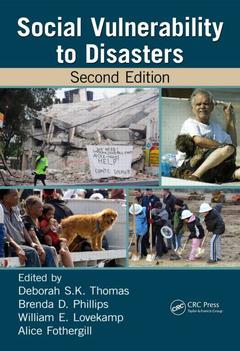Social Vulnerability to Disasters (2nd Ed.)
Coordonnateurs : Thomas Deborah S.K., Phillips Brenda D., Lovekamp William E., Fothergill Alice

The 2010 Haiti and Chili earthquakes, the 2010 BP oil spill in the Gulf of Mexico, and the 2011 Fukushima earthquake and tsunami in Japan are but a few examples of recent catastrophic events that continue to reveal how social structure and roles produce extensive human suffering and differential impacts on individuals and communities. These events bring social vulnerability to the forefront in considering how disasters unfold, clearly revealing that disasters are not created from the physical event alone. Equally important, people?even those considered vulnerable?respond in innovative and resilient ways that unveil the strength of human ingenuity and spirit. It is not a foregone conclusion that a hazard event, even a large one, will result in catastrophic loss.
This updated second edition of Social Vulnerability to Disasters focuses on the social construction of disasters, demonstrating how the characteristics of an event are not the only reason that tragedies unfurl. By carefully examining and documenting social vulnerabilities throughout the disaster management cycle, the book remains essential to emergency management professionals, the independent volunteer sector, homeland security, and related social science fields, including public policy, sociology, geography, political science, urban and regional planning, and public health. The new edition is fully updated, more international in scope, and incorporates significant recent disaster events. It also includes new case studies to illustrate important concepts.
By understanding the nuances of social vulnerability and how these vulnerabilities compound one another, we can take steps to reduce the danger to at-risk populations and strengthen community resilience overall.
Features and Highlights from the Second Edition:
- Contains contributions from leading scholars, professionals, and academics, who draw on their areas of expertise to examine vulnerable populations
- Incorporates disaster case studies to illustrate concepts, relevant and seminal literature, and the most recent data available
- In addition to highlighting the U.S. context, integrates a global approach and includes numerous international case studies
- Highlights recent policy changes and current disaster management approaches
- Infuses the concept of community resilience and building capacity throughout the text
- Includes new chapters that incorporate additional perspectives on social vulnerability
- Instructor?s guide, PowerPoint® slides, and test bank available with qualifying course adoption
Framing Social Vulnerability. Understanding Social Vulnerability. Theoretical Framing of Worldviews, Values, and Structural Dimensions of Disasters. The Intrinsic Link of Vulnerability to Sustainable Development. Socially Vulnerable Groups & Building Capacity. Class. Race and Ethnicity. Gender. Age. Disability. Health. Language and Literacy. Households and Families. Violence. Religion, Faith, and Faith-Based Organizations. Animals. Community Resilience. The Nature of Human Communities. Measuring and Conveying Social Vulnerability. Social Change and Empowerment. New Ideas for Practitioners.
Deborah S.K. Thomas, Ph.D., is an Associate Professor in the Department of Geography and Environmental Sciences at the University of Colorado Denver, where she also has a secondary appointment in the Department of Environmental & Occupational Health in the Colorado School of Public Health. She specializes in hazards and health geography and has over twenty years of experience working with geographic information systems (GIS) in disaster management and health applications, both in the U.S. and internationally. Her research and teaching interests focus on issues of vulnerability/resilience as they relate to both natural and human-induced hazards and health outcomes.
Brenda D. Phillips, Ph.D., is the Associate Dean and Full Professor of Sociology at Ohio University-Chillicothe. She is the author of Mennonite Disaster Service and an editor on Social Vulnerability to Disasters (CRC Press). In 2013, she was inducted into the International Network of Women in Emergency Management’s Hall of Fame. In 2012, she received the Blanchard Award for Excellence in Emergency Management Education. Professor Phillips has conducted research on disaster recovery since 1982, beginning as a student of E.L. Quarantelli at The Ohio State University’s Disaster Research Center. Her published research can be found in a variety of journals including the International Journal of Mass Emergencies and Disasters, Disaster Prevention, Disasters, Humanity and Society, the Journal of Emergency Management, Natural Hazards Review, and Environmental Hazards. She has been funded multiple times by the National Science Foundation to study disasters and vulnerable populations. Dr. Phillips has been invited to teach, consult or lecture in New Zealand, Australia, Germany, India, Costa Rica, Mexico, Canada, and the People’s Republic of China. She is a graduate of Bluffton University (Ohio) and The Ohio State University.
Date de parution : 06-2013
17.8x25.4 cm
Thèmes de Social Vulnerability to Disasters :
Mots-clés :
Tamil Nadu; Smart Phones; Disaster And Social Vulnerability; Disaster Life Cycle; Mennonite Disaster Service; FEMA Trailer; Disaster Risk Reduction; Human Development Index; Family Assistance Centers; Humanitarian Aid; Disaster Context; Housing Recovery; CBPR; Emergency Management Cycle; Unreinforced Masonry Buildings; Postdisaster Environment; Case Study; Hate Crimes; Emergency Management; Organizational Network Analysis; Disaster Risk; SLA; Practical Step; Vulnerability Assessment; Vulnerability Paradigm; Larger Families



